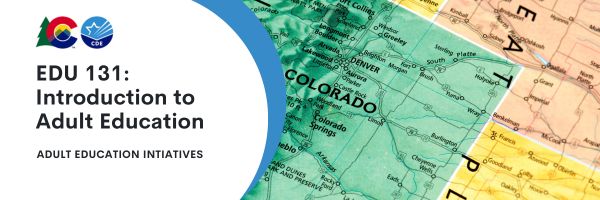
EDU 131 provides an introduction to adult education with an emphasis on providing instruction to adult learners developing their ability to listen, speak, read, and write in English and learners with skills below 12th grade equivalency. Key areas include adult education theories, principles, methods and techniques; adult education legislation, initiatives and movements; adult basic education services and service providers; understanding the adult learner; metacognition; the instructional environment; and professional development for adult educators.

EDU 132 provides an introduction to planning and delivering instruction to adult learners with an emphasis on developing the English language proficiency of non-native English speakers and improving the skills of learners whose skills are below 12th grade equivalency. Key areas include identification of learners’ skills, needs and goals; the use of information about learners to plan instruction and assessment; the development of learner independence; the creation of an instructional environment that supports and engages adult learners.

EDU 133 provides an introduction to adult education with an emphasis on providing instruction to adult learners developing their ability to listen, speak, read, and write in English and learners with skills below 12th grade equivalency. Key areas include adult education theories, principles, methods and techniques; adult education legislation, initiatives and movements; adult basic education services and service providers; understanding the adult learner; metacognition; the instructional environment; and professional development for adult educators.

EDU 134 provides an introduction to providing instruction to adults who are developing English language proficiency. Key areas include understanding the adult ESL learner, the language acquisition process and the language skills needed to complete each Educational Functioning Level (EFL); preparing written instructional plans; delivering level appropriate instruction using techniques and resources appropriate for adult language learners; using technology; and preparing adult ESL learners to transition to postsecondary education and careers.

This course provides an introduction to adult education with an emphasis on providing instruction to adult learners developing their ability to listen, speak, read, and write in English and learners with skills below 12th grade equivalency. Key areas include adult education theories, principles, methods and techniques; adult education legislation, initiatives and movements; adult basic education services and service providers; understanding the adult learner; metacognition; the instructional environment; and professional development for adult educators.
- Manager: Ellen Hogan
